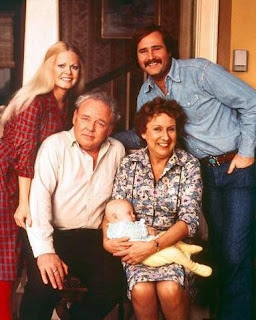After having watched an episode of “All in the Family” I could not help but contrast it with some of the shows that are airing today which also deal with the same type of family situations. In fact, one of the shows that I enjoyed comparing it with the most was “Everybody Loves Raymond.” I think that after taking a close look at these two shows we can get an idea of just how much our society and media have changed over the years.
The viewer can get one of the main and most impacting differences of these two shows after analyzing the two main couples. In “All in the Family,” the housewife could perhaps be considered somewhat naive. She does not show much independency and is most definitely shown as inferior to her husband. While he (the husband) is shown as a very narrow-minded macho type of guy who has control over his wife. Distinctively, in “Everybody Loves Raymond” the housewife is the one showing independency and control of the house while the husband is very mellow and the viewer could even consider he (the husband) is, colloquially speaking, being whipped by his wife.
One of the main similarities I found was the attitude of Archie, the husband in “All in the Family,” and the one of Frank Barone (the husband’s father-in-law) in “Everybody Loves Raymond.” In the episode screened in class, Archie shows himself as a very narrow-minded person (as I stated before) when it comes to homosexuality. One of his daughter’s friends is homosexual and Archie can’t even stand it. He makes remarks such as “we should open a window and let him fly away.” These type of comments reminded me a lot of Frank Barone (“Everybody Loves Raymond”), the most blunt father-in-law someone can have. Frank cares little about what people think of him so he is very open about his points of view which, in most cases, are very narrow-minded as well.
Years ago it was perhaps normal to see shows on TV talking so openly about subjects that are pretty delicate to society such as homosexuality. Nonetheless, I think that today we see less and less of those types of episodes because we live in a more accepting and discrete nation than it was during “All in the Family”. Also, people in the TV business maybe realize that gaining or losing viewers is just an episode away, so it’s best if directors play their cards right and not deal with any controversial subjects in an unbalanced manner. This is how, in my opinion, one could contrast “All in the Family” and “Everybody Loves Raymond” and find some very interesting insights.


No comments:
Post a Comment